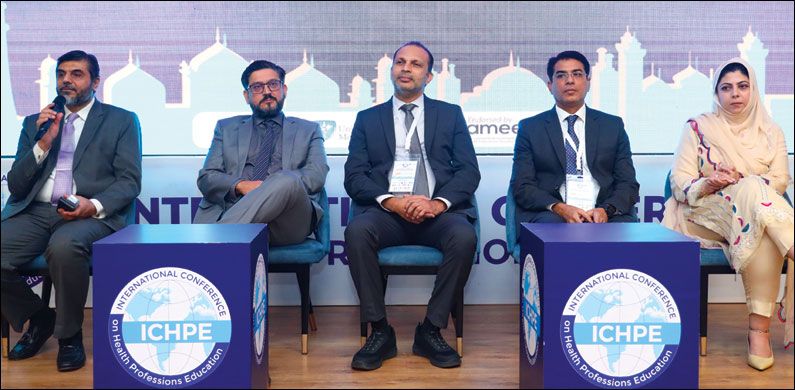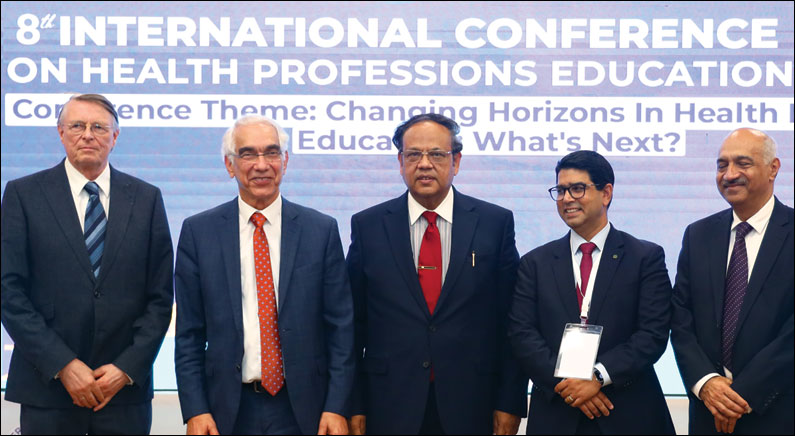Medical ChatGPT saves 40% time in diagnosis – Prof. Rehan Ahmed Khan
Let us integrate AI in curriculum, develop
critical thinking and problem solving skills
Selection of students for medical colleges
LAHORE: One of the symposiums during the recently held 8th International Conference on Health Professions Education (ICHPE) organized by University of Lahore was devoted to the Future Medical Graduate. Prof. Idrees Anwar from HBS Institute of Health Sciences Islamabad was the first speaker who spoke on Evolving admission criteria for medical schools. He discussed at length as to what type of medical students we will get and what should be criteria for admissions to select the best medical students.

Prof. Idrees Anwar (extreme left) speaking at the symposium on “Future Medical Graduates” held during the 8th ICHPE. Also sitting on the stage other speakers in the session are from (L to R) Prof. Rehan Ahmad Khan, Dr. Naveed Yousuf,
Dr. Masood Jawaid and Prof. Mahwish Arooj.
From 2025 to 2027, he said, we will get generation Z but after 2027 it will be Generation Alpha who will be seeking admission to the medical schools. The students will be spending 60-70% of the time online. Hence if we do not change the way students are selected, we will be selecting the wrong students. They will be digitally native, computer wizards. They will have short time for concentration and will be less physically active. We need to give importance to communication skills, pay attention to details. Give emphasis to empathy and attainable skills which they will lack. We will need to teach them problem solving and critical thinking. It requires team work. They will need leadership skills. We need to change attitudes, give importance to critical thinking and look at their mental capabilities.
They should go through medical and aptitude test. It can be IT based and we can have IT based examination for selection of students. Give importance to IQ test, computer literacy, critical thinking skills which should form the basis of selection of medical students. He laid emphasis on communication and inter personal skills and team work. There needs to be humanity in assessment which should be valid, reliable, credible and also feasible. There should be different criteria through which the students should be selected. He suggested that new assessment tools should be adopted by all medical schools.

Prof. Rehan Ahmad Khan from Riphah University Islamabad was the next speaker who pointed out that Medical ChatGPT saves 40% time in diagnosis. Artificial Intelligence, he remarked, is reshaping medical education. Students should be AI literate. AI is being extensively used in dermatology, histopathology. AI will take jobs of those physicians who are not AI literate. Benefits of Chat GPY, he further stated, are many. He then referred to interactive simulation, AI can help students make better clinical decisions. However, there are ethical issues. It has ethical, legal implications which he discussed in detail. It includes issues like patient privacy and data security. Many medical schools are adopting AI but there are issues of cost, funding, computer power and storage. He also referred to resistance to change and accessibility of AI. How medial educators will prepare medical students to work alongside AI. He suggested that let us integrate AI in curriculum, develop critical thinking and problem solving skills.

Group photograph shows Prof. Olle ten Cate, Prof. Salman Rawaf, Prof. Mughees Baig, Prof. Adil Hyder and Dr. Gohar Wajid who were invited speakers in one of the plenary session during the 8th ICHPE organized by UOL
on November 6th 2024.
Dr. Naveed Yousuf from Aga Khan University Karachi talked about Global Health Insurance and globalization, healthcare systems, cultural, social norms and technology. Global health needs to take care of infectious diseases, Non-communicable diseases like Cancer, substance abuse, mental illnesses. He also referred to the effects of malnutrition, food safety, environmental pollution, under and over nutrition, obesity, cancer, climate change, water and sanitation besides hygiene. There are Wars and constant Conflicts, injuries which have a long term psychological impact. There are one hundred twenty million displaced persons. Migration of people has its own effects. He laid emphasis on internal collaboration. For disease management, we need to practice preventive healthcare. In hospitals, we should give importance to community based education. Workforce should be based on needs. Inter personal collaboration and change in cultural and social norms will be needed. There should be emphasis on professionalism and changes in clinical reasoning. Medial education should be based on the country needs. He was of the view that medical education must change and align itself to the needs of tomorrow.

Dr. Masood Jawaid Associate Editor Pakistan Journal of Medical Sciences talked about bridging the gap and gave example of Nokia a famous brand of mobile phones which lost the No.1 positon and also the whole market share. Their Chief Executive remarked that “we did not do anything wrong but we lost” because they failed to adopt the change. Curriculum, he stated, should be a living document. Some universities in the world are now offering dual degree programmes. AI has a much greater role in medical education. He suggested that let the HEC, PM&DC and all medial institutions work together. There are some ethical aspects, we should know what can be done, what should not be done. There should be vertical as well as horizontal integration. We need to add and delete some material from the curriculum. Education should be used to change the world and Pakistan as well.
Prof. Mahwish Arooj Principal University College of Medicine and Dentistry at UOL was the last speaker in this session whose presentation was on “Are we ready to embrace future”. Artificial Intelligence, she said, is now everywhere. It is taking over the role of nurses, doctors, hospitals. We must realize are we ready for the change, she asked. Generation Alpha is digitally empowered. It will be the most educated generation which will be coming to the medical schools. One may ask will there be a medical college in future? Do we really need them? Medical colleges offer teaching training, faculty assessment.

Stanford University in United States, she said, is now offering all these courses free online. We need to produce virtually informed, clinically skilled healthcare professionals. She then referred to Flipped Classroom and said let us adopt modern personalized learning. Harward has started virtual teaching and training in hospitals. AI is doing excellent work in radiology. It is being used in disease diagnosis. However, there are no emotions in AI, empathy is missing. It lacks soul to understand humans. AI cannot replace humans but doctors do not have time to listen. Now humans are becoming Robots while Robots are becoming humans.
During the discussion it was emphasized that one cannot ignore the importance of clinical skills. Human eyes, hands and ear will remain important and they cannot be replaced by AI. However, most of the participants were optimistic and hoped that a working paper will be prepared and sent to the regulatory bodies including PM&DC which should give directions on how we are going to train the future doctors and impart medical education.



